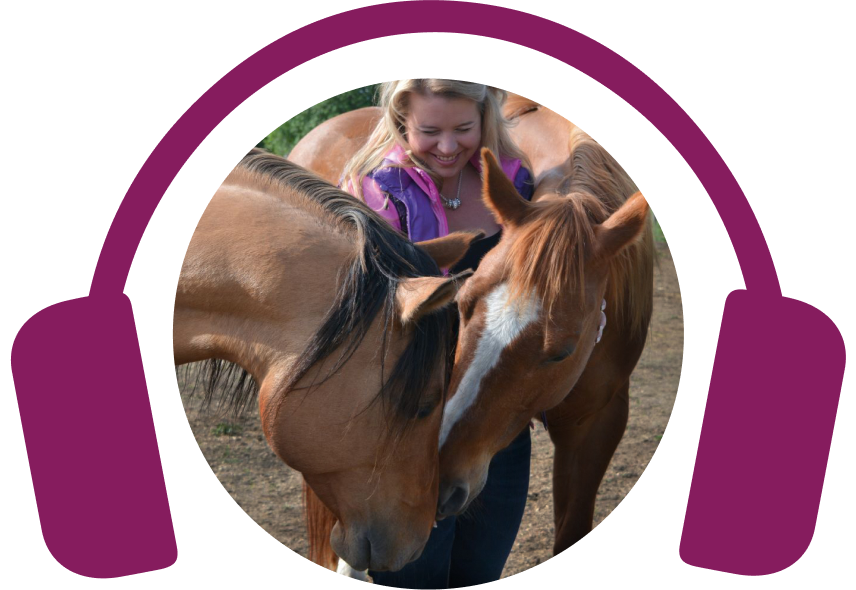Elisha’s Podcast
ELISHA’S PODCAST

Ready to get your horses on the path to better health?
This podcast was created to do just that.
Tune in to get new insights, perspectives, horse health tips, and real-life horse healing stories.
Take what you learn and apply it to your horse TODAY.

One Conversation at a time
From learning what to feed your horse and how to use nutrition effectively, to practicing prevention and approaching specific health challenges naturally, to just bringing your horse more joy and better health…
I’ve got you covered!

Check out my recent episodes
Today, we are tackling the topic of laminitis and exploring those early-stage situations where your horse begins to show signs of soreness and tenderness. What we focus on today does not include the more mechanical cases of founder laminitis but rather horses that tend to become sugar-sensitive as the grass begins to turn green in spring. Recognizing Sugar Sensitivity in Horses Some horses become sore or tender as soon as lush spring grass appears. It is often due to sugar sensitivity, and these horses may also be insulin resistant. Insulin resistance can present as swelling in the eyes, sheath, udders, lower limbs, or a general puffiness in the body. It is not always related to obvious hoof problems but often reflects a broader systemic reaction to dietary sugar. Real-Life Example At the facility I manage, several horses broke into a lush pasture and soon showed signs of swelling and tenderness despite us urging them to move. Even horses that were not usually at risk began showing symptoms. That highlighted just how quickly sugar overload can tip the balance and why it is crucial to act early. Step 1: Reduce Sugars The first step in managing sugar-induced laminitis is reducing sugar intake, especially from grass. Some horses can tolerate limited pasture, while others may not. Create dry lots, use fencing or panels to limit access, and have your hay sugar levels analyzed. Watch out for feeds containing molasses, vegetable oils, preservatives, and other additives that may spike insulin and cause inflammation. Step 2: Encourage Movement Exercise is critical. Even when a horse is sore, movement helps lower insulin, burn sugar, and reduce inflammation. It can be as simple as walking, ponying, or hand-jogging. Any movement counts, even 20 extra minutes a few times a week. For horses not currently ridden, gentle groundwork or hand-walking is enough to make a meaningful difference. Step 3: Add Supportive Footwear When Needed Hoof boots with padding can help to relieve pain and make movement possible for horses in extreme pain. Movement is essential for healing, so boots are a helpful short-term solution to get your horse comfortable enough to walk. Creative options, like diapers or duct tape, can also work until you find a better solution. When It Is More Than Just Sugar If you have reduced sugar and increased movement, and your horse is still inflamed or tender, you may be dealing with more than just dietary sugar overload. Persistent fat pads, a crested neck, and excessive thirst and urination can point to deeper insulin resistance. Every Horse is Unique Horses respond differently to diet and management. While some thrive on pasture combined with regular movement, others may continue to struggle, even when their sugar intake gets reduced and they exercise enough. Factors like breed, history, and individual constitution can influence their response. If you are following best practices but not seeing progress, you may need to explore deeper metabolic factors and consider targeted nutritional and organ support. Final Thought The sooner you become aware of early signs of sugar sensitivity and act on them, the better. Reducing sugar, increasing exercise, and providing hoof support when needed can make all the difference. If those measures are not enough, there is still hope, as most horses can regain their balance and comfort with the appropriate nutritional and metabolic support. Links and resources: Connect with Elisha Edwards on her website Join my email list to be notified about new podcast releases and upcoming webinars. Free Webinar Masterclass: Four Steps to Solving Equine Metabolic Syndrome Naturally Register for my self-paced course, Resolving Equine Metabolic Syndrome Naturally. The symptoms most horses experience from digestive issues and anxiety tend to cause them lots of discomfort. Fortunately, there is a wonderful plant horse owners can use to manage those conditions. Chamomile is a versatile herb with a wide range of uses for horses. It has a calming energy and a pleasant smell, and horses love it! The Link Between Digestion and Anxiety There is a close connection between digestion and anxiety in horses. Stressful events like separation or fear can trigger digestive issues such as colic or ulcers. Those two systems work in a cycle. So, when one is out of balance, the other often follows. Supporting both systems is the key to breaking that loop. A Holistic Strategy To help a horse heal, the owner must identify whether stress or digestion is the primary issue. Sometimes, calming the nervous system allows the gut to recover, while, in other cases, improving digestion eases emotional strain. Reducing stress even slightly can usually create enough momentum for healing. Chamomile Chamomile (Matricaria chamomilla) is a well-known traditional herb with a long history of medicinal use. It has yellow-centered white flowers that are easy to recognize. Chamomile contains beneficial compounds like calcium, magnesium, and flavonoids. Those minerals support the nervous system and reduce muscle tension, which is why chamomile is known for its relaxing and soothing properties. Whole Herbs Work Best Chamomile benefits digestion, the nervous system, muscles, immunity, and skin in horses. Its strength lies in its synergy. Due to the interaction of many compounds within it, chamomile provides a broad range of health benefits. Isolating a single ingredient can often reduce its effectiveness and cause side effects, which is why whole herbs are preferable. Targeted Uses Chamomile is soothing to the gut and the nervous system and can help reduce inflammation, support immune function, and provide antibacterial effects. Horses with chronic digestive tension or stress often benefit greatly from this herb. Chamomile is especially useful for: Flavonoids Chamomile is rich in flavonoids, which are antioxidants. Its compounds regulate cell function and boost immunity. A 2022 PubMed study identified 50 different flavonoids in chamomile, including quercetin. Chamomile also has antibacterial, anti-inflammatory, and potential anti-cancer properties. Practical Use and Dosage Cut and sifted chamomile is ideal for horses, as it stays close to its natural form and has a good shelf life. A typical starting dose is one tablespoon, with the option to increase to two. Most horses enjoy chamomile, and its gentle nature makes it easy to introduce. Chamomile can be used short-term for specific issues or longer-term (three months) for chronic imbalances. Chamomile for Variety Chamomile is a gentle herb that does not have a strong taste. So, even horses without anxiety or digestive issues enjoy chamomile added to their diet for variety. Homeopathic Chamomile (Chamomilla) Chamomile is also available in a homeopathic form, Chamomilla. That remedy often gets used for digestive upsets, nervous tension, and teething-related discomfort. It can be helpful for horses that are easily overwhelmed, hard to soothe, or showing signs of intense emotional distress that is difficult to calm. Final Thoughts Chamomile is a powerful, multi-functional herb. It supports the nervous system, digestion, and musculoskeletal system. Whether used to address chronic conditions or balance the system, it is a safe, soothing option worth trying. Links and resources: Connect with Elisha Edwards on her website Join my email list to be notified about new podcast releases and upcoming webinars. Free Webinar Masterclass: Four Steps to Solving Equine Metabolic Syndrome Naturally Register for my self-paced course, Resolving Equine Metabolic Syndrome Naturally. This week, our focus returns to the equine diet. Whether you are supporting overall health or addressing a particular issue in a horse, it always starts with their food. That often means identifying and removing dietary intolerances or introducing an anti-inflammatory or alkaline diet. Since each horse has a unique constitution, their diets must be individualized to support their specific sensitivities. Fresh Fruits and Vegetables for Horses Offer a variety of fresh produce like melons, shredded beets, cucumbers, watermelon rind, apples, blueberries, and carrots. Chop them into small pieces for easy eating, and avoid feeding large amounts of stringy celery to horses with dental issues or a history of choking. Using Cauliflower and Other Veggies Many horses enjoy nibbling on cauliflower occasionally. However, you should only feed it in small amounts since large quantities can cause gas. Always observe how your horse reacts to new foods and adjust accordingly. Incorporating Herbs Add herbs (chamomile, mint, raspberry leaf, chickweed, plantain, and milk thistle) to salads or treats. Herbs provide added health benefits, especially raspberry leaf for mares and other reproductive support. Let your horse explore different herbs to see what they prefer. Preparing and Serving Salads Make fresh horse salads once or twice a week, using any available clean or organic produce. If using non-organic items, wash them thoroughly. For picky eaters, introduce one ingredient at a time or mix new foods into their regular mash to help them adjust. Enrichment Through Foraging Scatter chopped fruits, veggies, and herbs around the pasture to encourage natural foraging and gentle exercise. This “Easter egg hunt” approach is stimulating and rewarding for your horse. Enhancing Flavor Some horses enjoy a splash of apple cider vinegar or a little olive oil as a salad dressing. Experiment with small amounts to find what your horse likes best. Benefits of Fresh Salads for Horses Feeding horses fresh salads regularly promotes better overall health, shinier coats, improved hoof condition, reduced inflammation, and more contentment. Fresh, live nutrients support the cells and tissues naturally. Moderation and Variety Are Key Avoid feeding too much of any single ingredient. Provide a varied mix to allow your horse to enjoy different flavors and nutrients without overindulging in one thing, and always pay attention to its preferences and sensitivities. Tips for Horses with Specific Conditions Avoid or chop stringy vegetables like celery finely for horses with dental problems or a history of choking. Salads and fresh foods can be particularly helpful for horses managing metabolic issues (EMS) by providing live nutrients without excess sugars or fats. Introducing fresh produce gradually and mixing it with regular feed helps sensitive horses adapt. Feeding a variety of herbs and fresh foods can support inflammation reduction, hoof health, and hormone balance, especially for mares. Always observe how your horse tolerates new foods and adjust accordingly. Links and resources: Connect with Elisha Edwards on her website Join my email list to be notified about new podcast releases and upcoming webinars. Free Webinar Masterclass: Four Steps to Solving Equine Metabolic Syndrome Naturally Register for my self-paced course, Resolving Equine Metabolic Syndrome Naturally.
Meet your host
Hi there, I’m Elisha Edwards

Meet your host
Hi there, I’m Elisha Edwards
I have helped guide thousands of horses back to good health over the years from a variety of different health challenges. And through my courses, webinars, and speaking engagements I educate and empower horse owner’s from around the world to take charge of their horse’s health using the holistic model of health care.
So I know first-hand how difficult and overwhelming it can be to navigate all the different opinions and conflicting information that you come across especially when your horse is faced with a health problem. In many cases, the journey is just as hard on the owners as it is on the horses.
I started Healing Horses with Elisha to guide you, support you, and encourage you through the process of prevention and recovery so you feel good about the decisions you’re making for them.
Here’s what I believe
I have seen countless horses with seemingly impossible health conditions that have been resolved so easily with the right combination of diet, nutrition, and natural remedies. In many cases, it is not the health conditions that prevents the horse from recovering, it is the lack of education, resources, and options that are available.
If the insight and information you gain from this podcast gives you some newfound hope or inspires you to take
a new approach then it has served it’s purpose.
Thank you for giving me the opportunity to help you improve your horse’s health.
Keep listening and learning. Your horse is worth it.
Listen Now
Tune in wherever you listen to your podcasts and follow me so you never miss an episode. I release a new one every Tuesday!

Leave a Review
Reviews help me reach more horses and also help me deliver more relevant content to you!

What my Listeners are saying

“Every time I think there is no way to top what you do – you elevate us to yet another level. I wish I had a fraction of your communication skills. You’re amazing and I am so grateful to be apart of the magic you are creating for horses and their humans.”
Tracey

“Your podcasts are fantastic! I get so excited to listen to the next one. I have 6 geriatric horses and your podcast has really opened my mind to new possibilities in their health and given me the strength to help them through hiccups in their well-being the past few months. I have a nursing education and you explain pathology better than my university professors.”
Sharon

“I can’t thank you enough for the Mindset Tips podcast. I really needed this reminder. It was just what I needed to hear to today.”



